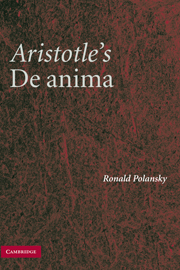Book contents
- Frontmatter
- Contents
- Preface
- List of Abbreviations
- Introduction
- COMMENTARY ON DE ANIMA: : Book 1
- COMMENTARY ON DE ANIMA: Book 2
- 1 Definition of Soul
- 2 What Is Life?
- 3 How Powers of Soul Are Distributed and United in the Soul
- 4 The Nutritive Faculty: Its Object and Subfaculties
- 5 Clarification of Being Affected, Living as Saving, and the First Definition of Sense
- 6 The Three Sorts of Sensible Objects
- 7 Vision, Medium, and Object
- 8 Hearing, Sound, and Voice
- 9 Smell and Odor
- 10 Taste Is a Contact Sense; the Tasteable
- 11 Touch, the Tangibles, and Sense as a Mean
- 12 Definition of Sense and Whether Sensibles Affect Nonperceiving Bodies
- COMMENTARY ON DE ANIMA: Book 3
- Bibliography
- Index
4 - The Nutritive Faculty: Its Object and Subfaculties
Published online by Cambridge University Press: 18 December 2009
- Frontmatter
- Contents
- Preface
- List of Abbreviations
- Introduction
- COMMENTARY ON DE ANIMA: : Book 1
- COMMENTARY ON DE ANIMA: Book 2
- 1 Definition of Soul
- 2 What Is Life?
- 3 How Powers of Soul Are Distributed and United in the Soul
- 4 The Nutritive Faculty: Its Object and Subfaculties
- 5 Clarification of Being Affected, Living as Saving, and the First Definition of Sense
- 6 The Three Sorts of Sensible Objects
- 7 Vision, Medium, and Object
- 8 Hearing, Sound, and Voice
- 9 Smell and Odor
- 10 Taste Is a Contact Sense; the Tasteable
- 11 Touch, the Tangibles, and Sense as a Mean
- 12 Definition of Sense and Whether Sensibles Affect Nonperceiving Bodies
- COMMENTARY ON DE ANIMA: Book 3
- Bibliography
- Index
Summary
If Aristotle has worked out his most common account of soul, and in doing so indicated that soul is the principle for all its capacities, he should now go on to the accounts of the soul's parts or capacities. He will begin with the most necessary of the soul's faculties, that which every mortal living being must possess, the nutritive capacity. The initial remarks about understanding of faculty by its operation and the operation in terms of its object explain some of his method but also allude to the topic of life since the various sorts of living seem to be operations of certain faculties. The nutritive capacity has an object upon which it works, food. In this way it prefigures the way the other faculties will relate to their objects. Moreover, the nutritive faculty breaks into subfaculties in connection with nourishment from food, growth, and reproduction. Here again there is parallel with the higher faculties, as sense breaks into five senses and mind divides into theoretical and practical mind. Aristotle also pulls together the subfaculties of nutritive soul by relating them all to saving the life of the living being. Most characteristic of life in all its forms may be this self-preserving in contrast with the typical self-destruction of motion. If life is activity in contrast with motion, this is as we should expect since activity has its end in itself and is always complete and continuable rather than on the way toward a limit and termination.
- Type
- Chapter
- Information
- Aristotle's De AnimaA Critical Commentary, pp. 200 - 222Publisher: Cambridge University PressPrint publication year: 2007



